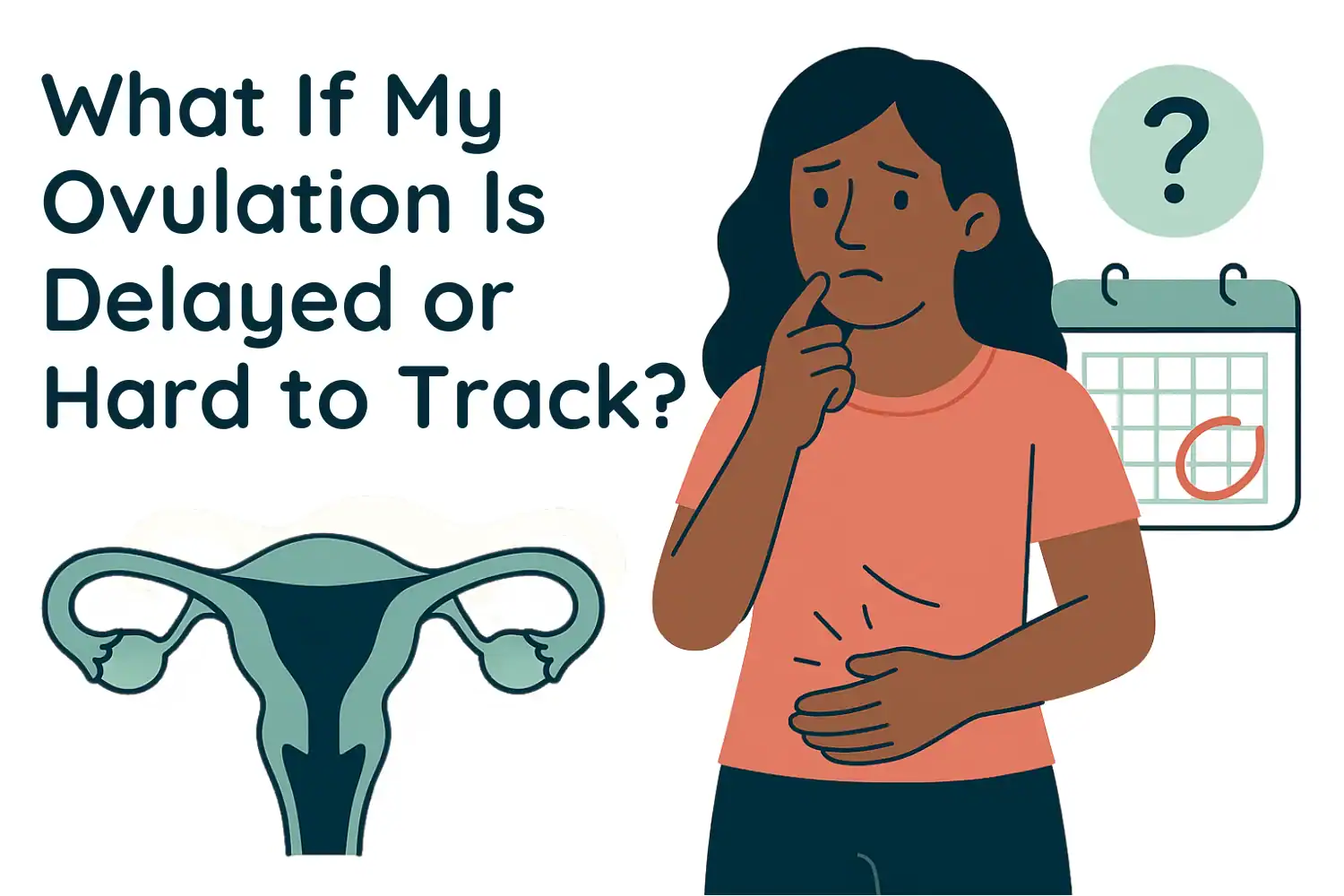What If My Ovulation Is Delayed or Hard to Track?
How to Predict Your Most Fertile Days (Even When It Feels Impossible)
If you’ve ever stared at an ovulation test wondering why it still hasn’t turned positive, or felt unsure whether you’ve missed your window altogether, you’re not alone. Ovulation doesn’t always follow the calendar, and that can be incredibly frustrating when you’re trying to conceive.
The good news? Even when things feel unpredictable, there are ways to understand your cycle better. Let’s gently walk through what might be happening and how you can feel a little more in sync with your body.
- How to Predict Your Most Fertile Days (Even When It Feels Impossible)
- Is It Normal for Ovulation to Be Delayed?
- What Can Cause Delayed or Irregular Ovulation?
- What's Considered "Late" Ovulation?
- Can You Still Get Pregnant If Ovulation Is Late?
- Why Isn't My Ovulation Test Working?
- Other Ways to Track Ovulation (That Aren't Just Pee Sticks)
- Still Not Sure If or When You're Ovulating?
- Quick Answers to Common Questions
Is It Normal for Ovulation to Be Delayed?
Yes. Delayed ovulation is more common than most people realize. You might expect ovulation around day 14 of your cycle, but it’s not unusual for it to happen a few days later (or even a week or more).
Your body isn’t a robotic machine. It’s responsive to what’s going on in your life. And sometimes, it needs more time.
What Can Cause Delayed or Irregular Ovulation?
There are several reasons your body might press pause on ovulation, including:
- Stress (emotional or physical)
- Illness or recovery from an infection
- Travel or major routine shifts
- PCOS or hormone imbalances
- Postpartum adjustments
- Coming off hormonal birth control
- Fertility medications like Clomid or Letrozole
Even breastfeeding or not getting enough sleep can shift things around. If your cycle varies by a few days here and there, that’s not necessarily a red flag. It’s just part of being human.
What’s Considered “Late” Ovulation?
Most people ovulate between cycle day 11 and 21, depending on the length of their cycle. But ovulation is considered “late” when it happens after day 21, especially in a regular-length cycle.
Still, what matters more than which day you ovulate is whether you’re ovulating at all and whether your luteal phase (the time from ovulation to your next period) is long enough to give a fertilized egg a chance to implant. Ideally, your luteal phase should be about 12 to 14 days long for the best support.
Can You Still Get Pregnant If Ovulation Is Late?
Yes, absolutely.
As long as you’re ovulating and timing intercourse around your fertile window, pregnancy is still possible. Sperm can live inside the body for up to 5 days, so if ovulation happens a little later than expected, there’s still a solid chance of conception.
Late ovulation might shift your expected due date or affect when a pregnancy test turns positive but it doesn’t automatically mean anything is wrong.
Why Isn’t My Ovulation Test Working?
Ovulation predictor kits (OPKs) work by detecting a surge in luteinizing hormone (LH), which usually happens 12 to 36 hours before ovulation. But several things can throw off those results:
- Testing too early or late in the day
- Diluted urine (from drinking lots of water)
- PCOS, which may cause high LH levels all month
- Not testing at the right time in your cycle
If you’re never getting a clear positive, or the test line is always dark, OPKs might not be the best method for you. That doesn’t mean you’re not ovulating. It just means you may need different tools.
Other Ways to Track Ovulation (That Aren’t Just Pee Sticks)
When OPKs feel unreliable, you still have options. Some gentle, natural ways to get insight into your cycle include:
- Basal Body Temperature (BBT): Taking your temp every morning to catch the slight rise after ovulation
- Cervical Mucus Tracking: Egg-white consistency usually signals your most fertile days
- Energy shifts, mood changes, or ovulation cramping (mittelschmerz)
Some people also use fertility apps or wearable trackers. Just know that no method is perfect -these are clues, not guarantees.
Still Not Sure If or When You’re Ovulating?
If things still feel murky even after trying multiple tracking methods, it might be time to:
- Keep a detailed cycle journal (including temps, mucus, symptoms, and test results)
- Talk to a healthcare provider, especially if:
- Your cycles are longer than 35 days or shorter than 21
- You go months without a period
- You suspect PCOS or thyroid issues
Remember, asking for support isn’t giving up. It’s getting closer to answers.
Quick Answers to Common Questions
Can delayed ovulation delay your period?
Yes. If you ovulate late, your period will usually arrive later, too, because your luteal phase stays about the same length.
Does late ovulation affect pregnancy tests?
It can. You may need to wait longer after ovulation for a positive result. Don’t panic if it’s not showing up when you expected.
Can you still get pregnant with PCOS?
Yes, many people with PCOS conceive, though tracking ovulation may take more support. Some ovulation kits made for PCOS track patterns instead of one-time surges.
Does late ovulation mean poor egg quality?
Not necessarily. Egg quality is affected by many factors (like age and overall health), but late ovulation alone doesn’t automatically mean a problem.
